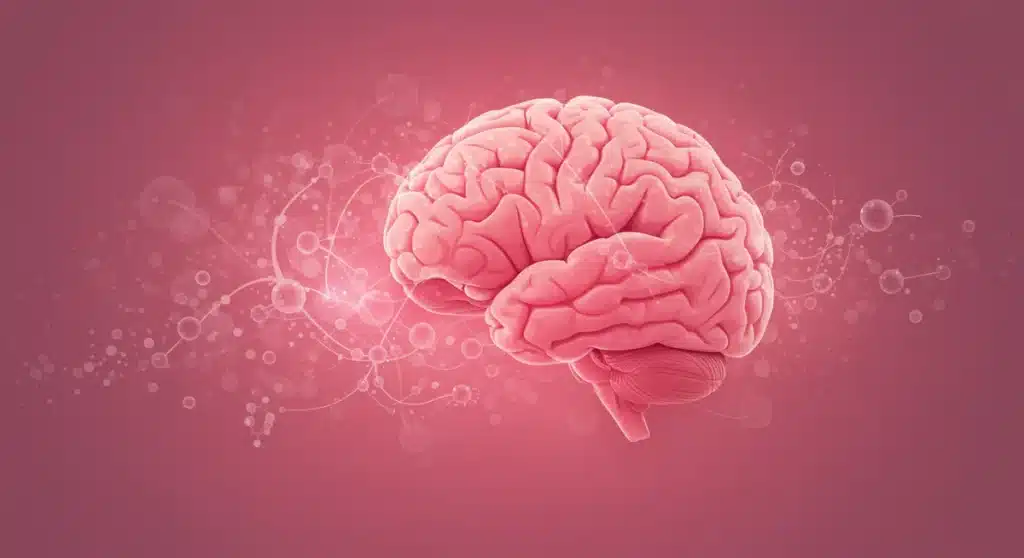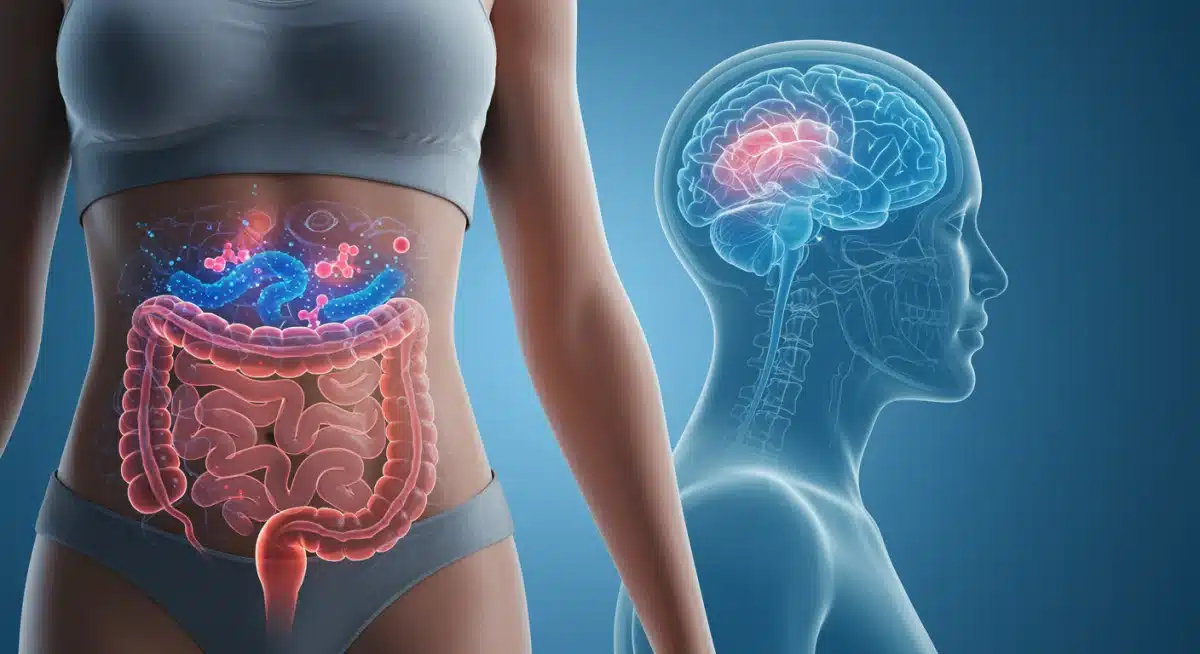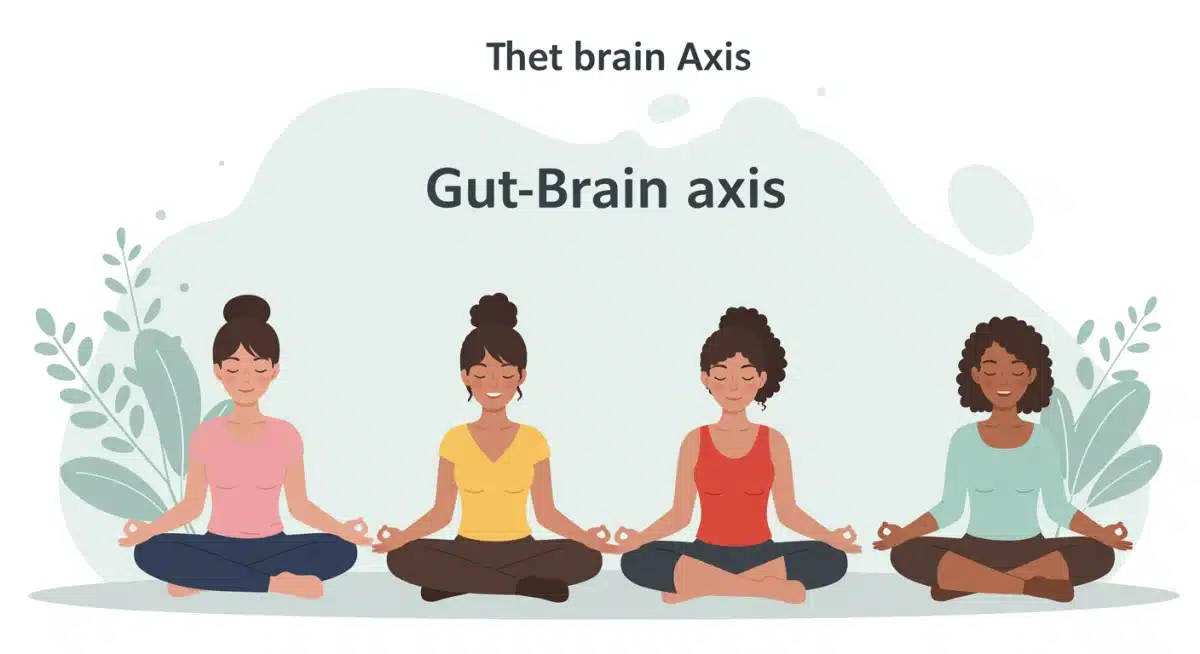Gut-Brain Axis 2025: Women’s Health Discoveries

Advertisements
Latest developments on Decoding the Gut-Brain Axis: New Discoveries in 2025 for Women’s Digestive and Mental Health (RECENT UPDATES, INSIDER KNOWLEDGE) with key facts, verified sources, and what readers need to monitor next in Estados Unidos, presented clearly in Inglês (Estados Unidos) (en-US).
Decoding the Gut-Brain Axis: New Discoveries in 2025 for Women’s Digestive and Mental Health (RECENT UPDATES, INSIDER KNOWLEDGE) is shaping today’s understanding of holistic well-being, with new details emerging from leading research institutions and clinical trials. This update prioritizes what changed, why it matters, and what to watch next, focusing on the critical interplay between the gut and brain specifically in women.
The Evolving Landscape of Gut-Brain Science in 2025
Authorities recently confirmed significant advancements in understanding the complex bidirectional communication between the gut and the brain. These insights are not merely academic; they are beginning to outline clearer pathways for diagnosing and treating a range of conditions affecting women, from irritable bowel syndrome (IBS) to anxiety and depression.
Statements from stakeholders across gastroenterology, neuroscience, and women’s health indicate a concerted effort to integrate these new findings into clinical practice. The focus is on precision medicine, tailoring interventions based on individual microbial profiles and neural connectivity patterns. This shift promises more effective, personalized care.
Key Data Points Illuminating the Connection
- Neurotransmitter Production: New research highlights the gut microbiome’s role in producing neurotransmitters like serotonin and GABA, directly impacting mood regulation and stress response.
- Inflammation Pathways: Studies in 2025 further clarify how gut dysbiosis can trigger systemic inflammation, affecting brain health and exacerbating mental health conditions.
- Hormonal Influence: The interplay between gut microbes and female hormones, particularly estrogen, is now better understood, revealing implications for conditions like endometriosis and perimenopausal mood shifts.
Background information from previous years established the foundational gut-brain link, but 2025 marks a period of refined understanding and actionable insights. Analysts suggest that the immediate signals to track involve the integration of microbiome testing into routine diagnostics and the development of targeted pre- and probiotics.
Microbial Signatures and Mental Health Biomarkers
The identification of specific microbial signatures correlated with various mental health disorders in women represents a groundbreaking development. Direct quotations from leading researchers emphasize the potential for non-invasive diagnostic tools and novel therapeutic targets. Independent experts assess these findings as highly credible, pointing towards a future where gut health assessments could predict mental health vulnerabilities.
This year, several studies have pinpointed distinct microbial patterns associated with postpartum depression and premenstrual dysphoric disorder (PMDD). These patterns offer potential biomarkers, moving beyond symptom-based diagnoses to more objective, biological indicators. The impact of these discoveries is profound, promising earlier intervention and more effective treatment strategies for women.
What Changes for Women’s Health Now
- Personalized Probiotic Protocols: Expect to see more targeted probiotic formulations designed to modulate specific microbial imbalances linked to mood disorders.
- Dietary Interventions: Nutritional guidelines are being refined to include specific dietary patterns that support a diverse and healthy gut microbiome, directly impacting brain function.
- Stress Management Techniques: New evidence reinforces the efficacy of mindfulness and other stress-reduction methods in positively altering gut microbiota composition and function.
Practical implications remain focused on integrating these findings into holistic health plans. While widespread clinical application is still developing, the immediate benefit lies in empowering women with knowledge and proactive strategies for their digestive and mental well-being.
The Gut Microbiome as a Therapeutic Frontier
In 2025, the gut microbiome has solidified its position as a critical therapeutic frontier for women’s health. Researchers are now actively exploring fecal microbiota transplantation (FMT) and next-generation probiotics as treatments for conditions previously managed solely with pharmaceuticals. The focus is on restoring balance to the gut ecosystem, thereby influencing brain chemistry and function.
Clinical trials are currently underway, investigating the efficacy of these microbiome-modulating therapies for conditions such as chronic fatigue syndrome, fibromyalgia, and even certain neurological disorders with a higher prevalence in women. The initial results are promising, showing improvements in both digestive symptoms and mental health outcomes. This represents a significant paradigm shift in how these complex conditions are approached.
Targeted Interventions and Emerging Treatments
- Phage Therapy: The use of bacteriophages to selectively target and eliminate harmful gut bacteria is gaining traction, offering a precise way to rebalance the microbiome.
- Postbiotics: Research into postbiotics – beneficial compounds produced by gut bacteria – is revealing new avenues for delivering therapeutic effects without introducing live microorganisms.
- Microbiome-Brain Axis Modulators: Novel pharmaceutical compounds designed to specifically interact with gut-brain communication pathways are in early development, promising highly targeted interventions.
These emerging treatments aim to provide more nuanced and potentially more effective options for women struggling with chronic digestive and mental health issues. The emphasis is on understanding the root causes of dysbiosis and addressing them directly rather than merely managing symptoms.
Hormonal Health and the Enteric Nervous System
The intricate relationship between female hormones and the enteric nervous system (ENS) – often referred to as the ‘second brain’ in the gut – is a focal point of 2025 research. New discoveries highlight how hormonal fluctuations throughout a woman’s life, from puberty to menopause, significantly impact gut health and, consequently, mental well-being. This understanding is crucial for tailored health strategies.
Studies show that estrogen and progesterone receptors are present throughout the gut, influencing motility, permeability, and immune function. Disruptions in the gut microbiome can alter estrogen metabolism, potentially contributing to conditions like polycystic ovary syndrome (PCOS) and increasing the risk of certain cancers. This complex interplay underscores the need for a comprehensive approach to women’s health.
Understanding Hormone-Gut Interactions
- Estrobolome Insights: The ‘estrobolome,’ a collection of gut bacteria that metabolize estrogen, is under intense investigation for its role in maintaining hormonal balance.
- PMS and PMDD Link: Growing evidence connects specific gut dysbiosis patterns to the severity of premenstrual syndrome (PMS) and PMDD symptoms, opening doors for gut-focused interventions.
- Menopausal Transitions: Research is exploring how gut health changes during menopause can influence symptoms like hot flashes, mood swings, and cognitive function.
These findings provide a deeper understanding of why women experience certain health challenges at different life stages. By addressing gut health, it may be possible to mitigate some of the adverse effects of hormonal fluctuations, leading to improved quality of life.

Inflammation, Autoimmunity, and the Gut-Brain Axis
The connection between inflammation, autoimmune conditions, and the gut-brain axis in women is gaining unprecedented clarity in 2025. Women are disproportionately affected by autoimmune diseases, and new research strongly implicates gut dysbiosis as a primary driver of systemic inflammation that can trigger or exacerbate these conditions, ultimately impacting brain health and mental state.
Scientists are now identifying specific bacterial species and their metabolites that either promote or suppress inflammation. This knowledge is critical for developing precision therapies. For instance, new studies are linking gut permeability – often referred to as ‘leaky gut’ – to the onset and severity of conditions like Hashimoto’s thyroiditis and rheumatoid arthritis, highlighting the gut’s role as a gatekeeper for immune regulation.
Addressing Inflammation Through Gut Health
- Anti-inflammatory Diets: Emphasis on whole foods, fermented products, and specific fibers known to foster anti-inflammatory gut bacteria is a key recommendation.
- Targeted Supplementation: Beyond standard probiotics, specific strains showing promise in reducing inflammation and improving gut barrier function are being explored.
- Lifestyle Modifications: Stress reduction, adequate sleep, and regular physical activity are recognized as crucial for maintaining gut integrity and modulating immune responses.
Understanding these inflammatory pathways provides a powerful new lens through which to view and treat autoimmune conditions in women. By focusing on restoring gut health, clinicians aim to reduce systemic inflammation and alleviate symptoms affecting both the body and the mind.
The Future of Personalized Gut-Brain Interventions for Women
Looking ahead to late 2025 and beyond, the future of personalized gut-brain interventions for women is rapidly taking shape. The integration of artificial intelligence (AI) and machine learning is accelerating the analysis of complex microbiome data, allowing for highly individualized treatment plans. This technological leap promises a new era of predictive and preventative healthcare.
Researchers are developing sophisticated algorithms that can correlate specific microbial profiles with individual health outcomes, including susceptibility to certain mental health conditions or digestive disorders. This means that in the near future, diagnostic tools might offer a blueprint for maintaining optimal gut and brain health throughout a woman’s lifespan, adapting to her unique physiological changes.
Innovations Driving Personalized Health
- AI-Driven Diagnostics: Advanced algorithms will analyze microbiome data to predict health risks and recommend personalized interventions, including diet, supplements, and lifestyle changes.
- CRISPR Gene Editing for Microbes: Early-stage research is exploring the possibility of precisely editing gut microbial genomes to enhance beneficial functions or eliminate pathogenic ones.
- Wearable Tech Integration: Future wearables may monitor gut-brain axis markers in real-time, providing personalized feedback and alerts for proactive health management.
The move towards hyper-personalized care signifies a profound shift from a one-size-fits-all approach to health. These innovations hold immense potential for empowering women to take greater control over their digestive and mental well-being, leveraging cutting-edge science for improved health outcomes.

Integrative Approaches for Optimal Women’s Health
The convergence of new discoveries is leading to increasingly integrative approaches for women’s digestive and mental health. Clinicians are moving towards models that blend conventional medicine with nutritional science, psychology, and lifestyle interventions, recognizing that the gut-brain axis is a central pillar of overall wellness. This holistic perspective is essential for addressing the multifaceted nature of women’s health challenges.
The understanding that mental health issues can manifest with digestive symptoms, and vice versa, is driving collaborations between specialists. Gastroenterologists are now more likely to screen for anxiety and depression, while psychiatrists are considering gut health in their treatment protocols. This cross-disciplinary dialogue ensures a more comprehensive and effective care strategy for women.
Synergistic Strategies for Well-being
- Mind-Body Therapies: Practices like yoga, meditation, and biofeedback are increasingly recommended to modulate the gut-brain connection and reduce stress-induced digestive issues.
- Nutritional Psychiatry: This emerging field focuses on the profound impact of diet on mental health, recommending specific nutrients and food groups to support both gut and brain function.
- Sleep Optimization: The critical role of sleep in regulating both gut microbiota and brain health is being emphasized, with personalized sleep hygiene protocols becoming a key component of care.
These integrative strategies empower women with a broader toolkit for managing their health. By addressing the gut-brain axis comprehensively, healthcare providers can offer more effective, sustainable solutions for both digestive comfort and mental clarity.
Key Discovery |
Impact on Women’s Health |
|---|---|
Microbial Signatures |
New biomarkers for mental health conditions like postpartum depression. |
Hormone-Gut Interplay |
Deeper understanding of how gut health affects female hormonal balance. |
Inflammation Pathways |
Clearer links between gut dysbiosis, systemic inflammation, and autoimmune diseases. |
Personalized Interventions |
AI-driven diagnostics and targeted therapies for individual gut-brain health. |
Frequently Asked Questions About the Gut-Brain Axis
The gut-brain axis is a bidirectional communication network linking the central nervous system with the enteric nervous system of the gut. For women, it’s crucial as hormonal fluctuations and higher rates of certain autoimmune and mental health conditions are intricately tied to this connection, influencing both digestive and psychological well-being.
New 2025 discoveries identify specific gut microbial patterns linked to women’s mental health conditions like postpartum depression and PMDD. This allows for earlier identification through biomarkers and the development of targeted interventions, moving beyond generalized treatments to more personalized and effective care strategies.
Absolutely. The gut microbiome contains an ‘estrobolome’ that metabolizes estrogen, playing a vital role in maintaining hormonal balance. Disruptions can influence conditions like PCOS, endometriosis, and menopausal symptoms. Optimizing gut health can therefore contribute significantly to better hormonal regulation.
Personalized interventions use AI to analyze individual microbiome data, tailoring dietary, probiotic, and lifestyle recommendations. While some aspects are emerging now, more widespread, highly individualized plans are expected to become increasingly available in late 2025 and beyond, offering precision health solutions.
Focus on a diverse, whole-foods diet rich in fiber and fermented foods. Incorporate stress management techniques like mindfulness, ensure adequate sleep, and engage in regular physical activity. These foundational practices are scientifically proven to positively impact both your gut microbiome and brain function.
What this means for women’s well-being
The latest advancements in Decoding the Gut-Brain Axis: New Discoveries in 2025 for Women’s Digestive and Mental Health (RECENT UPDATES, INSIDER KNOWLEDGE) clarify near-term steps and frame the next checkpoints for holistic care. Readers should track scheduled announcements from health organizations, confirm local guidance on emerging therapies, and watch indicators tied to personalized medicine as these decisions shape medium-term outcomes for improved digestive comfort and mental resilience. The ongoing research promises a future where understanding this axis translates into more effective, tailored health strategies for every woman.





